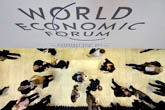The issue of supply chain risk took a high profile at the World Economic Forum (WEF) Annual Meeting in Davos, Switzerland. At the meeting, senior government figures and industry leaders spoke of developing ways in which economic damage caused by disrupted supply chains could be mitigated.
As part of the initiative, a new report was launched at the event. The report, 'New Models for Addressing Supply Chain and Transport Risks', produced in collaboration with Accenture, highlighted the urgent need to review risk management practices.
According to the WEF, governments and companies need to become more resilient in the face of emerging and complex risks. The largest risk is from the unknown. Major disruptions in the past five years – including the global financial crisis, the Yemen parcel bomb scare, flooding in Thailand and the Japanese earthquake and tsunami – have highlighted how risks outside the control of individual organisations can have unintended consequences that cannot be mitigated by one organisation alone. Encouragingly, more than 90% of those surveyed by the World Economic Forum and Accenture initiative indicate that supply chain and transport risk management has become a greater priority in their organisation over the past five years.
While global supply chains are increasingly complex and spread out, some critical components are only available in one location. "One critical part doesn't allow an airplane or a server to be manufactured and can cause total disruption of the supply chain," said Daniel J. Brutto, President, UPS International.
For the world's largest shipping companies, Somali piracy is the most serious threat. It costs between US$ 12-17bn every year in insurance, security and other costs, explained Dan Sten Olsson, Chief Executive Officer, Stena, Sweden.
Internationally, the report calls for governments to come together to tackle risks, whether they be climate change or piracy off the Gulf of Aden. In the latter case, international law needs to be updated to decide jurisdictions and military responsibility, among other issues.
One disincentive to improving risk management is that financial markets have been rewarding companies for being very lean. But this additional cost is necessary for businesses to be able to absorb shocks and to rebound afterwards.
Yet, risks remain because today's supply chains, especially in emerging markets, can be long and not entirely traceable. Overall, the report concludes that there is a need to introduce greater flexibility in operations and enhance collaboration between businesses and governments – nationally and internationally – to better manage the risks to global supply chains.
eyefortransport













